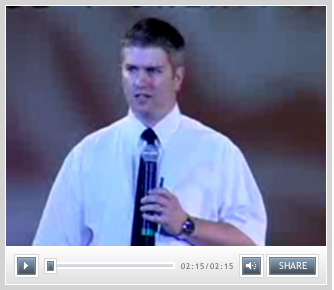Put Away the Smoke and Mirrors
October 2009
By The Author
“Smoke and mirrors.”
“Dog and pony show.” “Image is everything.”
These phrases, which are deeply embedded in the vernacular and philosophy of old-school marketing firms, may appear on the surface as nothing more than harmless – if hackneyed – corporate speak.
However, these seemingly innocuous clichés actually betray one of traditional marketing's dirtiest secrets. Once the clever headlines, catchy taglines and glamorous images are stripped away, all that’s left at the core is fluff, spin, deception and the art of inventing meaning where there is none.
Even
they don’t believe their own hype. Yet these are the very same people to whom business owners and decision makers have entrusted their livelihood for decades.
Who’s to say the interactions you have with your followers can’t be meaningful?At its heart, your business shares the same goal with every other: to grow, thrive and compete successfully in your market niche. In order to do this, you must engage your customers and build a community around your brand.
With old marketing, the relationship between seller and consumer has always taken place at arm’s length, using traditional media channels that rely on flash and frequency, that require a tremendous investment to outshine and outspend the competition.
However, who’s to say your relationships with your customers can’t be personal? Who’s to say the interactions you have with your followers can’t be meaningful?
The answer: No one who values your success over their own bottom line.
Leading by example
We tend to take established brands for granted, assuming the secret to their success lies in their ability to pour unlimited resources into every available advertising medium to broadcast slick, highly polished messages of self-promotion. However, a closer look at some of today’s most recognizable names reveals a different story.
Let’s start with Amazon. If you think about it, there is nothing inherently glamorous about an online bookstore. Yet Amazon has managed to create a following so pervasive that it catapulted from an upstart dot-com to one of the world’s most powerful e-commerce megabrands, all without ever relying on pricey TV and magazine ads.
“Advertising is the tax you pay for unremarkable thinking.” How did they do it? The answer is not smoke and mirrors. They did not trick anyone into drinking the Amazon Kool-Aid. Rather they committed themselves and their budget to creating a better shopping experience by developing more intuitive technology, stronger distribution networks and more competitive shipping deals. These are genuine and distinct advantages from which their customers benefit each and every time they interact with the brand, thus solidifying Amazon’s reputation for ease of use, low prices and quality service.
Another brand that has risen to the top of its category by flying in the face of traditional marketing wisdom is Geek Squad. As founder Robert Stephens explained at
Advertising Age’s 2007 IDEA Conference, “Advertising is the tax you pay for unremarkable thinking.”
Instead, by taking a creative approach to what he himself calls an innately “boring business,” he has transformed his one-man show into a corporation that employs more than 17,000 nationwide. In an
interview with
Inc. magazine, Stephens explained his low-budget strategy:
Without spending any money on marketing, we were able to get people talking about Geek Squad by tapping into themes and archetypes people already understood. We embraced the fact that we were geeks, and we dressed all of our employees like 1960s NASA technicians, since NASA is a symbol of problem solving, teamwork and impossible tasks…In our early years, we found that more than 90 percent of people found us through word of mouth.
In fact, he credits his initial lack of monetary resources with forcing him to work harder, to be more innovative, to dig deeper, to develop an original and authentic approach that has differentiated Geek Squad from all other competitors:

At the crossroads of marketing and meaning
So where do these two concepts intersect for you?
It lies in the fundamentals. Your business – let alone your category – would not exist if there were not a legitimate need for your product or service among some segment of the population. There is a community out there that is receptive to your message, that is waiting to be wowed with a newer, better way of doing things.
Furthermore, your company would not be here today if at some time someone somewhere hadn’t felt passionately enough about whatever it is you do to risk everything to get that company off the ground. It’s time to reignite that passion and convey it in a way that inspires others.
Make a conscious decision to be better, to be different. Resolve to enhance your usefulness; commit yourself to unrelenting innovation; make sure you are delivering a premium experience to your customer;
then tell people about it in a genuine and compelling way.
And that’s where you’ll need help. But you don’t need just any old traditional agency; you need a partner who shares your belief in what you have to offer and your passion for why you do what you do better than anyone else. You need experts that can show you how to communicate this to your audience in a real and honest way, using available technologies to build community among your customers and keep them actively engaged to the point where they include you as part of their identity.
When you have something meaningful to say, and you say it with conviction, people will listen. No smoke and mirrors required.
Great authors are defined by their ability to set fire to the written word. All too often in today's digital information age, that creative spark is stifled, leaving the Web littered with content that is lifeless and ineffectual. Fame Foundry's Author has made it his mission to revive the act of writing as an art form, harnessing the power of language to command attention and ignite a following. It's the difference between telling a story and building a legend.